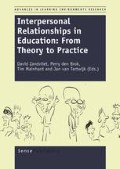Abstract
Education is essentially a relational activity, where the interaction between teacher and learner creates a learning space in which knowledge is constructed and coconstructed. It is clear however that the learning space is not just cognitive. It is coloured and nuanced by emotion and interpersonal relationships. Indeed teachers and schools have long acknowledged the influence of school on social and emotional development, a fact that has been acknowledged in more recent times through the formalisation of social and emotional learning in school curricula (Durlak et al., 2011).
Access this chapter
Tax calculation will be finalised at checkout
Purchases are for personal use only
Preview
Unable to display preview. Download preview PDF.
References
Brackett, M. A., Reyes, M. Regina, Rivers, S. E., Elbertson, N. A., & Salovey, P. (2011). Classroom emotional cimate, teacher affiliation and student conduct. Journal of Classroom Interaction, 46 (1), 27-36.
Burke, R. V., Oats, R.G., Ringle, J. L., O’Neill Fichtner, L., & DelGaudio, M. (2011). Implementation of a classroom management program with urban elementary schools in low-income neighbourhoods: Does program fidelity affect student behaviour and academic outcomes? Journal of Education for Students Placed at Risk, 16 (3), 201-218. Doi:10.1080/10824669.2011.585944
Christianakis, M. (2011). Parents as ‘help labor’: Inner-city teachers’ narratives of parent involvement. Teacher Education Quarterly, 24, 157-178.
Cowley, S. (2001). Getting the buggers to behave. London: Continuum.
Durlak, J. A., Weissberg, R. P., Dymnicki, A. B., Taylor, R. D., & Schellinger, K. B. (2011). The impact of enhancing students’ social and emotional learning: A meta-analysis of school-based universal interventions. Child Development, 82(1), 405-432.
Hickey, B. (1999). Inter-agency approaches to behavioural challenges. Unpublished research report, Targeting Educational Disadvantage Project, Mary Immaculate College, Limerick.
Jennings, P. A., & Greenberg, M. T., (2009). The prosocial classroom: teacher social and emotional competence in relation to student and classroom outcomes. Review of Educational Research, 79(1) 491-525.
Jennings, P. A., Snowberg, K. E., Coccia, M. A., & Greenberg, M. T. (2011). Improving classroom learning environments by cultivating awareness and resilience in education (CARE): Results of two pilot studies. Journal of Classroom Interaction, 46(1), 37-48.
Jones, R. A. (2003). The construction of emotional and behavioural difficulties. Educational Psychology in Practice, 19(2), 147-157.
Kemmis, S. & Wilkinson, M. (1998). Participatory action research and the study of practice. In B. Atweh, S. Kemmis, & P. Weeks (Eds.), Action research in practice, partnerships for social justice in education. London: Routledge
Korthagen, F. A., & Kessels, J. (2009). Linking practice and theory: The pedagogy of realistic teacher education. Mahwah, NJ: Lawrence Erlbaum Associates.
Lyons, C. W., & O’Connor, F. (2006). Constructing an integrated model of the nature of challenging behaviour: a starting point for intervention. Emotional and Behavioural Difficulties, 11(3), 217-232.
Martino, W. (2000). Mucking around in class, giving crap, and acting cool: Adolescent boys enacting masculinities at school. Canadian Journal of Education, 25(2), 102-112.
McCready, L. T., & Soloway, G. B. (2011). Teachers’ perceptions of challenging student behaviours in model inner city schools. Emotional and Behavioural Difficulties, 15(2), 111-123.
Murphy, J. J. (1999) Common factors of school-based change. In M. A. Hubble, B. L. Duncan, & S. D. Miller (Eds.), The heart and soul of change: What works in therapy. Washington, DC: American Psychological Association.
O’Hara, J., Byrne, S. J., & McNamara, G. (2000) Positive discipline: An Irish educational appraisal and practical guide. Ireland: Colour Books Ltd.
Quinn Patton, M. (2002). Qualitative research and evaluation methods (3rd ed.) Thousand Oaks, CA: Sage.
Roache, J., & Lewis, R. (2011). Teachers’ views on the importance of classroom management on student responsibility. Australian Journal of Education, 55(2), 132-146.
Smith, P. K., & Sharp, S. (Eds.). (1994). School bullying: Insights and perspectives. London: Routledge.
Smyth, E., & Dunne, A. (2005). The Working Together Project: An evaluation of the final year, Unpublished research report. Dublin: Economic and Social Research Institute.
Sutton, R. E., Mudrey-Camino, R., & Knight, C. C. (2009). Teachers’ emotional regulation and classroom management. Theory into Practice, 48, 130-137. Doi:10.1080/004058840902776418
Author information
Authors and Affiliations
Editor information
Editors and Affiliations
Rights and permissions
Copyright information
© 2014 Sense Publishers
About this chapter
Cite this chapter
Lyons, C.W., Higgins, A. (2014). The Role of Emotions and Interpersonal Relationships in Educational Reform. In: Zandvliet, D., Brok, P.d., Mainhard, T., Tartwijk, J.v. (eds) Interpersonal Relationships in Education. Advances in Learning Environments Research. SensePublishers, Rotterdam. https://doi.org/10.1007/978-94-6209-701-8_8
Download citation
DOI: https://doi.org/10.1007/978-94-6209-701-8_8
Publisher Name: SensePublishers, Rotterdam
Online ISBN: 978-94-6209-701-8
eBook Packages: Humanities, Social Sciences and LawEducation (R0)

